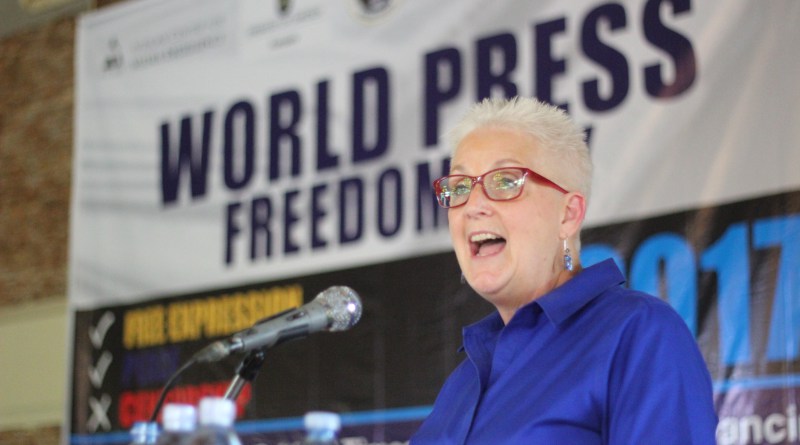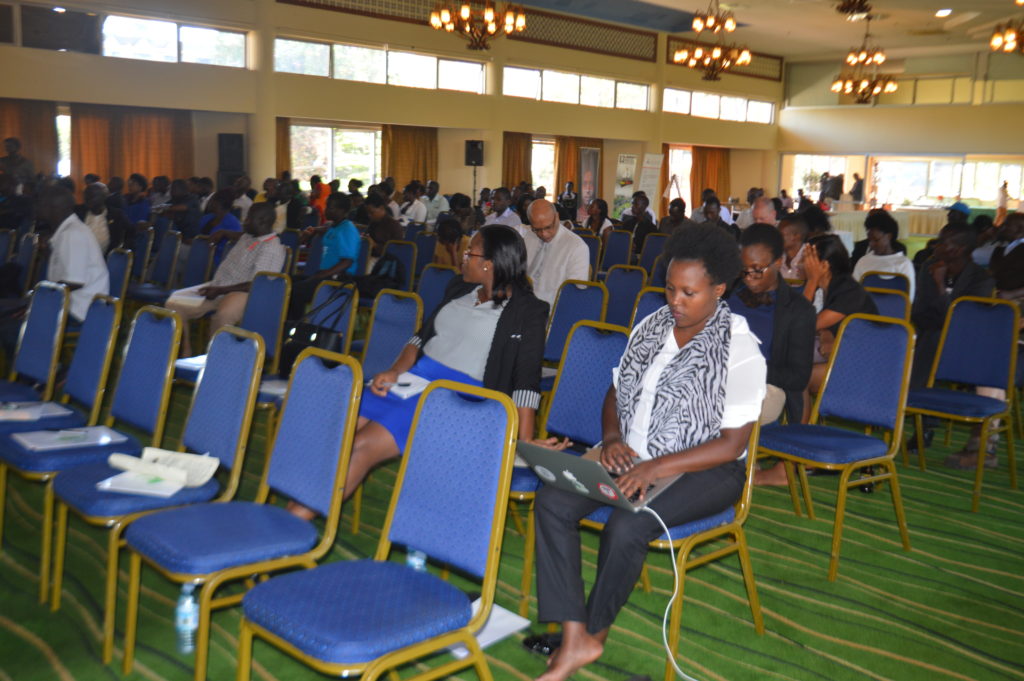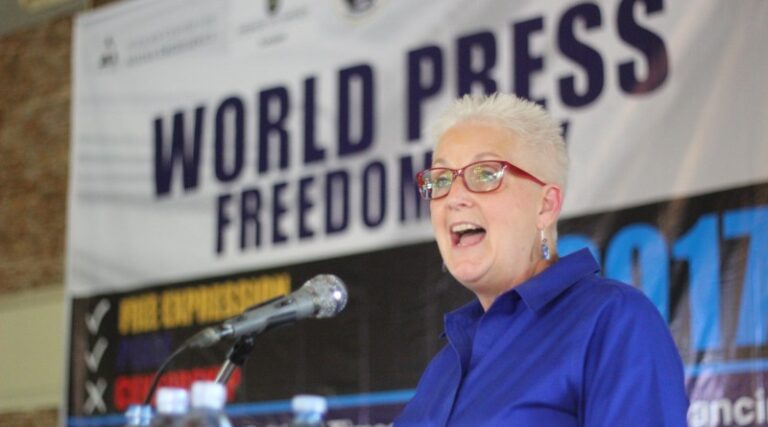
Remarks by U.S. Ambassador Deborah R. Malac
World Press Freedom Day Celebrations
Golf Course Hotel, Kampala
Wednesday, May 3, 4:30pm
Good afternoon, and thank you for that warm welcome. I am pleased to join you all today as we mark this year’s World Press Freedom Day. This is a great opportunity to re-dedicate ourselves to protecting the rights and freedoms of journalists here in Uganda and around the world – and to ensure all citizens enjoy the right to express their ideas and opinions openly and freely.
As I find myself in front of a room full of journalists, it’s only fitting that I begin my remarks this afternoon by telling a story – a true one – that I think is relevant in light of today’ s discussions.
More than a century ago, the American media was filled with a peculiar specimen called the “muckraker” – a somewhat pejorative term used to describe reform-minded journalists who attacked political leaders, usually in stories about corruption. Today, we label such characters as “investigative journalists,” but at the time, the public considered muckrakers to be gossip-mongers, and not serious, upstanding members of the media profession.

That is, until a man by the name of Upton Sinclair came along. Many of you may not know or have heard of him, but he became one of the most notable American authors in the first half of the 20th century, eventually winning the Pulitzer Prize. But Sinclair’s real claim to fame arrived in 1906, when he published the classic muckraking novel, The Jungle – an examination of the harsh lives and working conditions of exploited immigrants in Chicago. The novel depicted massive health violations and unsanitary conditions in the city’s meatpacking industry, then among the country’s largest and most profitable.
Needless to say, the book’s damaging portrayal – following six months of investigation – created significant controversy. Domestic and foreign purchases of U.S. meat fell 50 percent, threatening a growing industry and the American economy. The U.S. President at the time, Theodore Roosevelt, declared Sinclair a “crackpot,” “unbalanced,” and “untruthful.” What Sinclair had published was vulgar to some and shocking to many, but that’s not the end of the story.
Rather than try and ban Sinclair’s work, destroy his reputation, or throw the author in jail, American officials and the public alike asked themselves a question: Is this the kind of country in which we want to live? The answer very clearly was no.
The book galvanized public opinion, spurring calls for labor reforms and efforts to enhance food safety. The pressure ultimately pushed the U.S. Congress to enact new legislation that improved sanitary conditions in meat processing plants and create the predecessor of today’s Food and Drug Administration.
The Jungle was certainly damaging, an embarrassment to the country that could jeopardize jobs and economic growth. But without Sinclair’s reporting, and without the public knowing what conditions were like in those Chicago meatpacking plants, there may not have been reform. Workers may have continued to operate in unsafe conditions for years. Congress may not have acted to make food safer, or created a federal agency to ensure medicine was properly tested before given to patients. In short, Sinclair’s book – protected by the U.S. Constitution and laws guaranteeing freedom of the press – directly contributed to America’s development at a critical time.
This story is really just a long way of saying that freedom of the press and freedom of expression are not just fundamental human rights, they are also vital contributors to development. That brings us to the theme of this year’s press freedom celebrations: how the media contributes to the creation of peaceful, just and inclusive societies.
In my mind the correlation is obvious: a free press encourages the open exchange of competing opinions, promoting dialogue over conflict. A media that operates without constraints exposes corruption and mismanagement, thereby contributing to transparency and good governance. Journalists allowed to speak with anyone at any time give a voice to every citizen, ensuring all views are heard and represented. These freedoms are the hallmarks of a developed country and a vibrant democracy.
Today, unfortunately, these freedoms are increasingly under attack – around the world and here in Uganda. We all know the story of Dr. Stella Nyanzi. Whether or not you agree with her message or her tactics – and certainly, many do not – she is still entitled to express her opinion. As Uganda’s constitution states, every person shall have the right to freedom of speech and expression, as well as the right to freedom of thought, conscience and belief.
Dr. Nyanzi’s case, however, shows that such constitutional rights and freedoms apparently have limits, particularly when those opinions are critical of the country’s leaders. And when a government constricts the rights and freedoms of its citizens, the future and the development of the country suffer as well.
Freedom of speech and expression can be difficult to tolerate. For example, in my country, burning the American flag is legal, as our Supreme Court has upheld flag burning is freedom of expression. Now, I personally find burning our flag offensive. But I don’t have to like it, or agree. I must tolerate it as a fundamental right, because when rights begin to be limited, democracy is limited too.
Sadly, Dr. Nyanzi’s case is just the latest of serious and growing constraints the media is facing in Uganda. In the past year alone, authorities have obtained court orders to ban reporting on matters of public interest, like the murder of Felix Kaweesi. The offices of The Observer have been ransacked twice in the past year, threatening its ability to operate. A local journalist was kidnapped in broad daylight last month. Media professionals have had their houses broken into, their possessions stolen, their phones monitored, and their lives routinely threatened. One was charged with “abetting terrorism” for simply reporting on the events in Kasese last year.
Despite what some officials may claim, these events are not fabrications. They are not cries for attention, or the result of personal disputes. These are real threats, putting real lives and livelihoods at risk. They undermine those constitutional rights to a free press and free expression. And they ultimately threaten Uganda’s development.
Now, we all know the counter-arguments. An irresponsible press corps makes ethnic tensions and endangers Uganda’s security. The media is biased and appears intent on embarrassing the government, contributing to public mistrust. The constant stream of reporting about corruption, violence, and political infighting paints a negative picture of the country and scares away potential investors, threatening Uganda’s development and growth.
Allow me to address each of these points. Many members of Uganda’s media fraternity, I think we can agree, do not have a solid foundation in basic reporting skills or journalistic ethics. Too many fail to check the facts or to quote officials accurately. Yes, we’ve all seen lies, rumors, and other fabrications make their way into print, onto the air, or online. I have frequently been the target of such sensationalism or mis-reporting myself. And so the press corps – reporters and editors alike – must take more responsibility to ensure reporting is fair and factual. But at the same time, it is a leap to say the press is responsible for sectarianism and insecurity in the country.
On charges of media bias, let me just say this: Nowhere is it written that the press – in any country – must serve as the government’s cheerleader-in-chief. Certainly, there have been many times in my career when I thought the press was unfair or pushing a particular story to generate controversy. But really, so what? I can complain about it, but negative press doesn’t give me the right to close down a newspaper or shut down social media.
The issue of negative press – whether you want to call it “fake news” or “biased journalism” – is not new. Governments and the media have had an adversarial relationship for generations. This has certainly been the case in the United States. Both Democratic and Republic presidents have had contentious relationships with the press. Such tension is a normal and necessary element of democracy, because it promotes transparency and encourages good governance. We’re all aware of the verbal assaults launched against the media by politicians who don’t like how they’re portrayed in the press, who claim the media does nothing but lie and distort the facts.
But while bad press may be irritating, and can certainly warrant criticism, it does not justify physical attacks, threats or harassment against journalists.
The press has a responsibility to report the facts as they are, not how government officials might wish them to be. And if those facts prove embarrassing to certain officials … well, that’s the fault of no one but the official who did something wrong in the first place. The press should be biased – biased in favor of the public interest – because it is the media’s relationship to serve as a watchdog and ensure a country’s leaders are doing the work they were elected to do. That is true in Uganda, in the United States, and around the world.
As for the litany of negative stories, let me repeat what I just said: Journalists should report the facts. And if the facts are that there is violence occurring, or corruption is rampant, or that patients aren’t getting their medicine, that’s all information worth making public. While the media certainly should highlight the positive accomplishments of Ugandans and the country, it is not the media’s job to hide negative stories and only position the country in the best possible light.
In the U.S. we have an annual tradition called the White House Correspondents’ dinner. The most recent was just a few days ago. This year, the host of the event stood in front of hundreds of journalists and poked fun at the President, crossing the line into insult. Some of the humor was not funny, and some remarks were cruel.
However, as the host noted at the end, the U.S. is a stronger nation because we have the right to stand up and say what we think, even about our president. Those who disagree have a right to say their piece too, and as citizens, it is up to all of us to form our own opinions, based on the information presented.
When the press is harassed and restricted, journalists practice self-censorship. Citizens are afraid to express their opinions. These are conditions that prevent development, that make a country less diverse and less democratic. A free press that can give a voice to every citizen helps make this a better country for everyone. A free press is a champion for Uganda, not its enemy.
There are those who think that by eliminating opposing voices, their ideas will simply vanish. But in the words of slain American civil rights activist Medgar Evers, “You can kill a man, but you can’t kill an idea.” Attempts to make government critics disappear will not make the problems go away; it will only make them worse by sowing further mistrust, alienating the public, and undermining the rule of law. That is not the kind of development Uganda needs, or the kind of development Ugandans want.
So Uganda – especially its journalists – now faces a difficult choice. To you, the journalists – I realize that for many of you, your profession is increasingly dangerous. It may no longer be worth it to face the constant harassment, the low pay, or the poor working conditions. And there would be little shame if some of you decided to follow another path.
But I would ask all of you to try and remember why you became journalists in the first place. It certainly wasn’t for the money or the fame. More likely it was because you wanted to make a difference, to help make Uganda a better country, to tell the story of Uganda as it should be told. If these are your reasons, I encourage you to stay in the fight, because your work, your profession, your rights and freedoms, are all key to Uganda’s continued development.
Which of you might be the next Upton Sinclair? Which of you might write the story that catapults Uganda’s growth and development, making this country more peaceful, more just, and more inclusive? That person may be here today, but only if we dedicate ourselves to ensuring free speech, a free press, and free expression.
I want all of you to know that the U.S. Mission in Kampala will be your biggest champion. We may disagree with you, grumble about one story or another, but we believe in your rights and your profession. We will continue to support programs that improve your capabilities and skills. We believe you should be free to practice journalism, responsibly, without fear or constraint.
Thank you.

